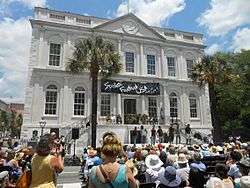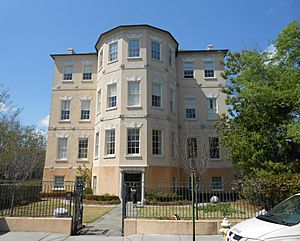Spoleto Festival USA facts for kids

The 2013 festival opened on May 24, 2013, with a ceremony at Charleston's City Hall
|
|
| Date | late spring |
|---|---|
| Duration | 17 days |
| Location | Charleston, South Carolina |
| Theme | performing arts festival |
The Spoleto Festival USA in Charleston, South Carolina, is a really big and important festival for performing arts in America. It was started in 1977 by a famous composer named Gian Carlo Menotti. He won a special award called the Pulitzer Prize. Menotti wanted to create a festival in the U.S. that was like another one he started in Spoleto, Italy, called The Festival of Two Worlds.
When they were planning the American festival, they looked for a city that felt as charming as Spoleto, Italy. They also needed a city with lots of theaters, churches, and other places to hold performances. Charleston was chosen as the perfect spot. Menotti said Charleston was "intimate," meaning you could easily walk from one theater to the next. He also liked its "Old World charm" in its buildings and gardens. Plus, it was a city big enough to welcome many visitors for the festival.
This festival happens every year in late spring and lasts for 17 days. It shows off both well-known and new artists. You can see over 150 performances of opera, dance, theater, classical music, and jazz.
Contents
Festival History in Charleston
How the Festival Began
The festival faced some money challenges right from the start. This led to changes in who was in charge. In 1976, Theodore "Ted" Stern, who was the president of the College of Charleston, became the new chairman. There were also some disagreements involving Menotti.
Menotti was the artistic director for the festival since it began. In 1991, he said he didn't want to continue his contract. He felt there were artistic differences and he didn't have enough control. He said, "I no longer feel it is my festival... I'm treated like a clerk."
Menotti also had a difficult relationship with Nigel Redden, the festival's general manager. Redden questioned Menotti's choices for shows and how money was spent. This caused a split on the festival's board. Some supported Redden, and others supported Menotti, including Charleston Mayor Joseph P. Riley, Jr. The mayor strongly supported Menotti. He even said the city might stop helping the festival if Menotti left.
In May 1991, Menotti gave an ultimatum: either Redden and his supporters would leave, or he would. In August 1991, Redden resigned. The next month, 19 of the 46 board members also left.
Overcoming Challenges
These changes affected the festival in 1992. The budget was lower, and there were about 20% fewer shows. In earlier years, the festival got a lot of money from private donations. But in 1992, these donations dropped.
By 1993, the disagreements became too much. Menotti and the Charleston festival board argued about who was in charge, the artistic direction, and money. Menotti left the festival in 1993. However, the local board owned the rights to the festival's name. They decided to continue the festival without Menotti.
Milton Rhodes became the new general manager in November 1993. He worked hard to fix the festival's money problems. He helped cancel about $400,000 in debt. He also got a loan from South Carolina to cover another $600,000 in debt. But the money troubles continued, and the 1995 festival lost even more money.
In July 1995, Nigel Redden was asked to come back to help. The festival was over $1,000,000 in debt. The 1995 festival spent 20% more than its budget. Its full-time staff was cut in half. Redden had been good at fixing the festival's money issues before. He had turned a $500,000 debt into a $1.4 million surplus. When he returned in 1996, Redden again helped the festival's finances. He quickly raised $1.6 million and cut the debt in half.
What the Festival Aims For

The festival wants to show the best art possible. It also focuses on helping young artists. It supports all kinds of performing arts. The festival loves new and modern ideas. It also enjoys giving famous artists special chances to perform. One of its main goals is to let young artists work with experienced directors, designers, and performers.
Many world-famous artists performed at Spoleto Festival USA early in their careers. These include Renée Fleming, Emanuel Ax, Joshua Bell, Jean-Yves Thibaudet, and Yo-Yo Ma.
Each year, the festival creates its own operas. These are often rare masterpieces by famous composers. Or they are traditional works shown in new and exciting ways. The festival also presents theater, dance, and music. This ranges from classical music to jazz, bluegrass, soul, and blues. Since it started, the festival has shown over 200 new works from around the world and the U.S. Some famous premieres include Creve Coeur by Tennessee Williams and The American Clock by Arthur Miller.
Piccolo Spoleto: A Local Celebration
Piccolo Spoleto is the official partner festival to Spoleto Festival USA. The City of Charleston's Office of Cultural Affairs runs it. After two years of smaller festivals, Piccolo Spoleto became an official part of the Spoleto program in 1979.
While Spoleto Festival USA features artists from all over the world, Piccolo Spoleto highlights amazing local and regional artists. It has hundreds of performances across the city. Piccolo Spoleto is a great match for the international Spoleto festival. Its 700 events in 17 days turn Charleston into an exciting celebration of performing, writing, and visual arts. Piccolo Spoleto ends the day before the main festival. It finishes with a free concert in Hampton Park. Since 1984, the closing ceremonies have been held at Hampton Park.
Spoleto Festival USA Orchestra
Every year, young musicians from across the country try out to join the Festival Orchestra. This orchestra is the festival's main music group. The orchestra works with the Resident Conductor and Director of Orchestral Activities, John Kennedy. They also work with guest conductors. They perform opera, symphonic music, choral music, chamber music, and modern music.
Over the years, the Festival Orchestra has been a great chance for young musicians to get a lot of experience performing. Many musicians who were part of the Spoleto orchestra now play in almost every professional orchestra in the United States and in many other countries.
 | John T. Biggers |
 | Thomas Blackshear |
 | Mark Bradford |
 | Beverly Buchanan |

